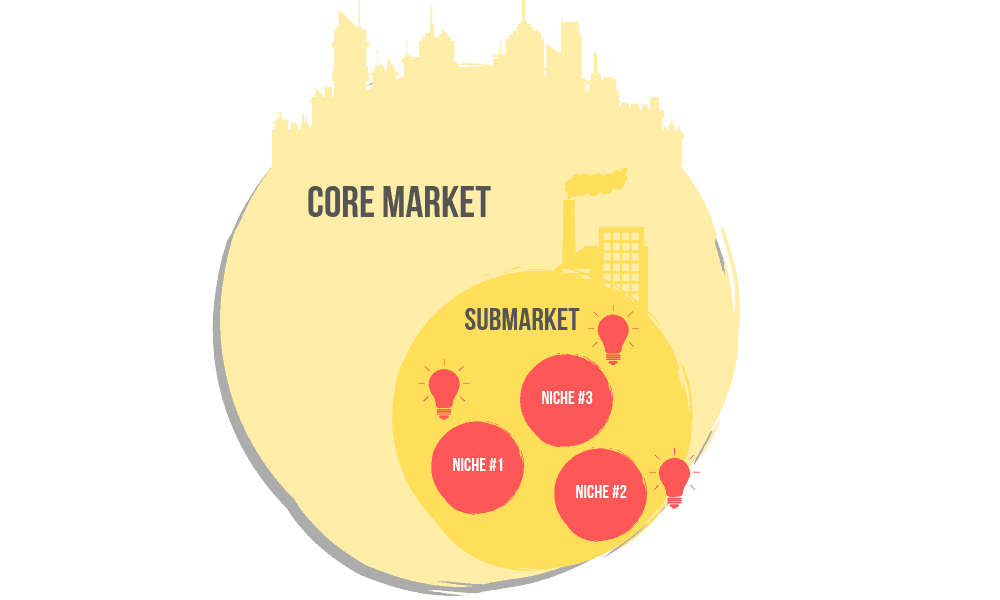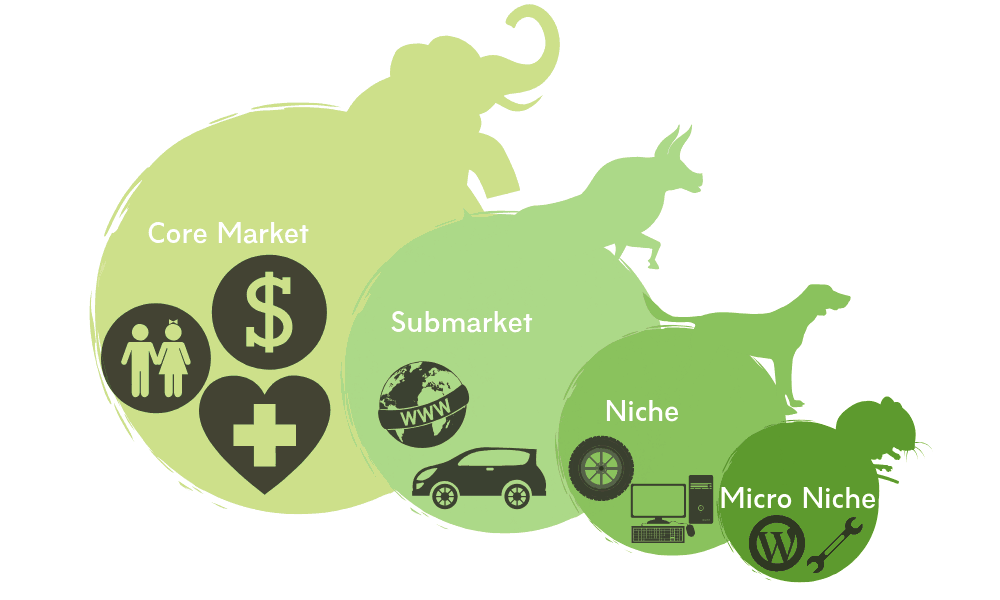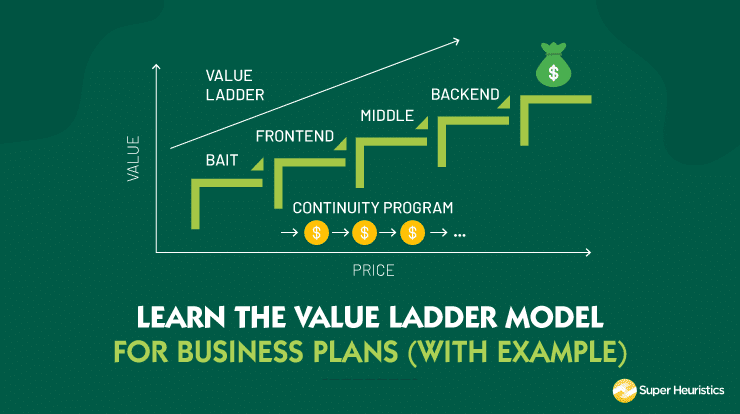
I recently told you about How to launch a Product Successfully in a Competitive Market, some two weeks back. Even before I had put that thought on paper, I knew that there had to be follow up. That's because niche and hyper-markets work differently as you will figure out shortly. Therefore, what should be my niche marketing strategy is what you would wonder. And this one is on that.
If you are someone who is working on a project that you know is entirely in a niche or a hyper-niche market then what should be the thought process that you should be looking at while creating your niche marketing strategy.
If you have found out your niche already, that is great. If you haven't yet, let me tell you its not that easy. And just because of that, I will let you know what can you do and where can you look up to get niche market and niche business ideas.
But, for the rest of us, what the heck is a niche? Let me tell you.
What is a Niche and a Hyper-Niche?
Imagine you are in a market where everyone is selling food. They are all showcasing more or less the same products. They are all making a lot of noise to get people’s attention, fighting to take the better place, have the bigger banner, have the lowest prices and what not.
Then, there is a small corner where there is a quiet person sitting and servicing clients. This man sells food that others don’t sell, different and more sophisticated.
There is not a lot of crowd in that corner but paying clients keep coming and going without the man having to make noise or claim he has the best stuff at the lowest price.
This man has found a niche.

What is a Niche explained diagrammatically by Ankit Singla
Definition of a Niche Market
As per Shopify, one of the largest e-commerce platform for niche market sellers, niche market is a segment of a larger market that can be defined by its own unique needs, preferences, or identity that makes it different from the market at large.

What is a Hyper-Niche or Micro Niche explained diagrammatically by Ankit Singla
Definition of a Hyper-Niche or Micro Niche Market
A Hyper-Niche or Micro Niche is a further specification within a niche market that makes your market and your targeting extremely focused. This specification could be based on the products that you choose to sell or the target segments and sub-segments that you may choose.
How Nice is a Niche?
In order for you to think about your niche marketing strategy, let me tell you why would anyone think in terms of niches and reduce their own market. At least that is the biggest apprehension that I have heard of when talking about niche marketing strategies.
A Niche is a limited area in the market which borders are very well defined. There are big and small niches and we all belong to one or more niches.
When we talk about small niches we talk about those groups of customers with very specific needs and tastes that are neglected most of the time by the mainstream marketing.
This doesn’t have to always mean that none is targeting that small niche but for sure it is not crowded as a bigger niche. Or not yet.
For example, let’s talk about the Music Industry. In the preparation for this article, I had a friend telling me how in 1999 the “Indie/Folk” genre could be considered a Small Niche covered only by small independent labels in the US.
He further told me that after 2010 the World fell in love with Mumford and Sons, Lumineers and cities became crowded by people dressed like the Old West anywhere on the globe. Indie/Folk, banjos and hipsters become mainstream.
Starting in a niche or a hyper-niche doesn’t just require you to shout less in the market to be seen but it will give you a very strong position if the niche grows and explodes.
Being in a Niche Market is not easy, or is it?
Now if you are reading this article most probably you already identified your niche or you know how to find a small niche for you but…are you sure you can handle it?
Starting in a small niche has a lot of problems like:
The word small does say that the total volume of the market is limited in terms of individuals.
For example “buyers of Batman Equipment in Gotham City” that would mean that you have 3 clients: Batman, Batgirl, and Robin.
Now imagine if you have a store of clothes made with “Recycled Plastics” in your city. How big will it be?
If the total available number of clients is small in the beginning, it can be frustrating because the sales peak slowly. After peaking sales you can easily reach the saturation point.
Now all of these problems can be solved with a good marketing. Here as some really basic rules that could work wonder in small niche markets
1. Don’t Start Without a Clear Picture
If you are selling something “mainstream” like “iPhones with 30% discount” you can afford placing yourself in a crowded place, make people aware you are there and wait for clients.
In a small niche market, you need to know EVERYTHING. Who is part of your niche, what other niches they can be part of, what other niches and segments you can target through them?
Your marketing personas must be developed to the point that you go have dinner with them.
For example, let’s suppose you sell ancient watches. That’s a small niche but where is your ideal customer going in your city to buy those?
Nowhere because the only option is Amazon? To a nearby city?
And how many of them are specifically interested in German Watches of the First World War?
Is it worthy for you to get more of that to have a sub-niche highly loyal?
2. You Need to be an Expert in Your Niche
This rule applies to most of the businesses and every niche. You have got be an expert.
In fact, in a small niche not applying this principle can be a biblical catastrophe. That is because in a small niche market it’s highly possible that majority of your clients actually a lot of things, in detail and depth, about the stuff you are selling.
3. Upsell to Avoid Saturation
Once you cover the rules 1 and 2 you can come up with an upselling plan that can protect you from saturation. If you have an organic health food store in a city where everyone loves fast foods and you know you have on average 1000 clients, you can not just say “at least they eat healthy so they will live longer”.
You need to upsell.
If they come once a week for the grocery shopping you have to make them spend more or come more often. Events, giveaways, freebies, contests, social media these are all good tactics to increase the frequency and the value of their purchases.
4. Be a Part of the Tribe or…Create it
The sense of community is the main thing to leverage on for marketing, but in a small niche market, it’s more than important. You need to know your consumers really well, and in most of the cases, you need to bring them together.
It could also go to the extent of knowing all your customers’ favourite magazines, websites, associations, and clubs related to your niche.
If there is nothing like that for them you better create it to build that sense of community and be recognized everywhere from members of the same niches everywhere in the world.
Now you are fully equipped to challenge your small niche and launch your product or service.
If, while reading this, you came up with more ideas on marketing in nices, feel free to let me know about them in the comments section below.






